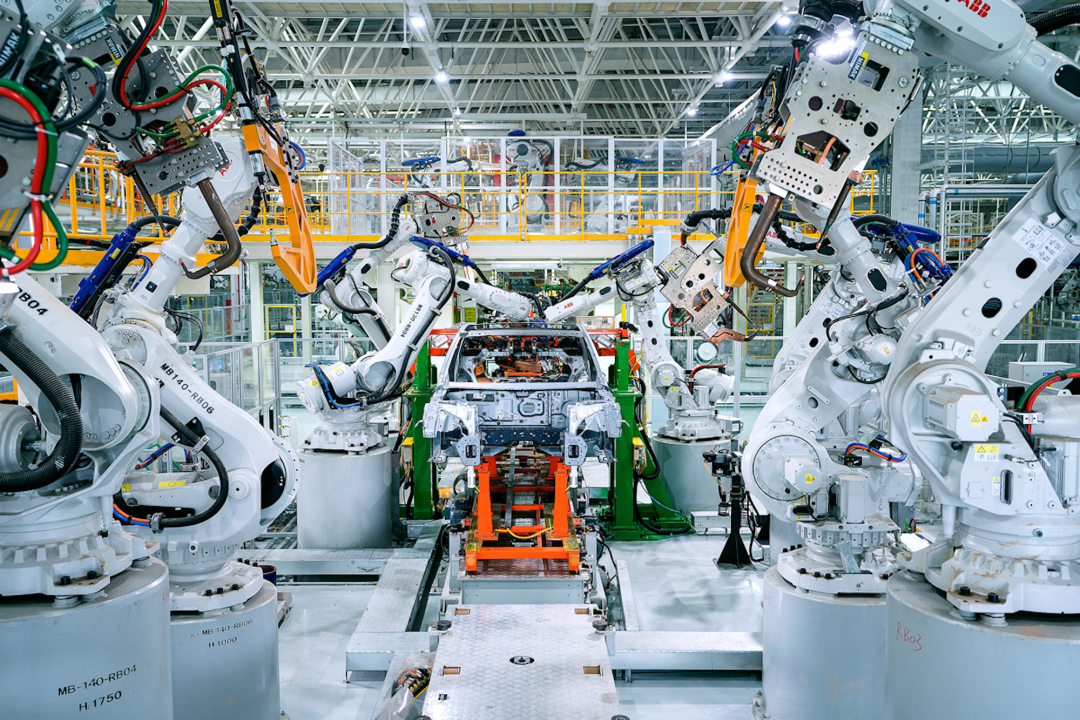The "lean staffing" and intelligence of automobile factories, and the breaking of the old world of global automobiles by Chinese automobile manufacturing
![]() 09/02 2024
09/02 2024
![]() 657
657
In the current wave of change in the global automobile industry, China's automobile industry is undergoing unprecedented transformation and development with its unique pace and posture.
The popularization of factory automation, the improvement of automobile manufacturing efficiency, and the rise of intelligent and cross-border intelligent supply chains have driven the rapid development of the automobile industry while also posing severe challenges, jointly shaping the complex landscape of China's automobile industry development.

01
With the advancement of Industry 4.0, automation technology has been widely applied in China's automobile manufacturing industry. Automobile factories are accelerating their transformation towards automation and intelligence, which is also an important driver for China's automobile overtaking on curves.
In leading domestic automakers such as BYD, Geely, and Chery, the widespread use of automated production lines has not only improved production efficiency but also significantly reduced the demand for human resources. The trend of "lean staffing" has become the norm in many advanced manufacturing factories.
The automation rate in key production processes such as stamping, welding, painting, and final assembly continues to increase. Robots and intelligent equipment are becoming the protagonists on the production line, and the trend of lean or even unmanned production processes is nearing completion. The automobile manufacturing sector is undergoing the largest transformation in history.
The scenario of 'robots producing cars' that Elon Musk is creating is not limited to Tesla and is expected to become a reality in many Chinese automobile factories in the future.
The trend of "lean staffing" in automobile manufacturing enhances production efficiency, reduces manufacturing costs, and improves production safety and stability. The high level of automation and intelligence in factories also prompts automotive industry workers to transition to higher-skilled, higher value-added positions, thereby driving changes in the internal management models of automobile factories.
We often complain that traditional automobiles cannot meet the needs of the new era, or that traditional marketing strategies are difficult to adapt to the development of social media. In essence, traditional management models have become difficult to adapt to highly automated and intelligent production environments.
Automobile factories will continue to deepen the integration of automation and intelligence, driving the intellectualization, flexibility, and customization of production processes. The construction of smart factories, especially the new manufacturing model of "human-machine collaboration," will also become one of the important directions for the transformation and upgrading of the automotive industry.
02
With the introduction of intelligent management of production lines and flexible manufacturing systems, automobile factories can complete more production tasks with lower costs and shorter lead times. The innovations in production have made China a crucial base for global automobile production, with annual automobile production continuing to grow.
However, while the domestic market is vast, the growth rate of vehicle ownership does not always match production growth. When production efficiency improves rapidly but market demand grows slowly, especially under current economic slowdowns and shifting automobile demand, inventory backlogs and cash flow difficulties lead to price wars, compressing corporate profit margins and hindering sustainable development of the entire industry.
On the premise of completing automation and intelligent transformation of factories, automakers can leverage big data and artificial intelligence technologies to accurately predict market demand and truly achieve on-demand production. Flexible production lines and personalized customization can also promptly respond to changing market demands.
From the moment a user opens the ordering page, personalized configuration options and timely production in the factory constitute a one-stop information platform, helping automakers deliver new cars upon launch.
03
Meanwhile, the application of technologies such as autonomous driving, Internet of Vehicles, and smart cockpits is gradually transforming the form and function of automobiles. Automobiles are gradually evolving from traditional transportation tools into intelligent terminals, a trend that is driving automobile manufacturers towards technological transformation and spurring significant new supply chain demands.
Automobile intelligence requires highly integrated hardware and software system support. The traditional automobile supply chain is being redefined, and the introduction of cross-border technologies such as electronic components, software services, and cloud computing has complicated supply chain management, especially with higher requirements for managing the technical capabilities, quality control, and delivery times of new cross-border suppliers.
Whether it's localizing research and development or rapidly iterating technology, cross-border collaboration will become the trend. Automakers will collaborate more closely with internet, electronic information, and other technology companies. It is necessary to conduct industry-university-research cooperation and collaborative innovation to jointly promote the research and production of smart cars.
Competition in the automobile market is less about design, functionality, and price and more about the ultimate test of automakers' overall operational capabilities.
Against the backdrop of increasing global environmental awareness, green products such as new energy vehicles and intelligent connected vehicles will become key development directions for the future. China's automobile industry has made significant progress in these emerging areas, but it is far from sufficient.
As multinational automakers accelerate their integration into China's automobile industry and Chinese automobile brands speed up their international expansion, China's automobile industry faces multiple challenges in areas such as automation, intelligence, and cross-border collaboration, but it also becomes a powerful driving force for industry advancement.
BYD, Geely, and Chery automobile manufacturing plants, as well as new partners in the automotive industry such as Huawei, Tencent, and Baidu Apollo, are working together to reshape China's automobile industry, ultimately triggering significant changes in the global automotive landscape.







